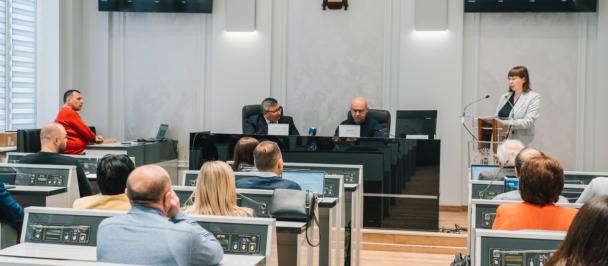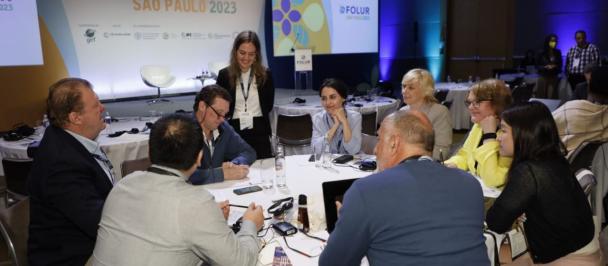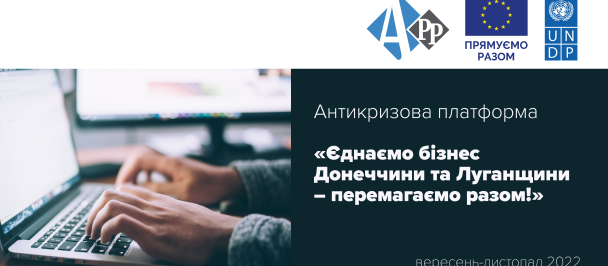UNDP experts visited the regions of northern Ukraine to analyse opportunities for introducing sustainable livestock management and restoring peatlands.
Promoting sustainable livestock management and restoring ecosystems in northern Ukraine
December 15, 2022

Meeting with Bilokorovytska united territorial community representatives, Zhytomyr region
Since the beginning of the full-scale Russian invasion, Ukraine has suffered significant losses in the agricultural sector. According to the Center for Strategic Communications and Information Security, as of 1 September 2022, Ukraine's agriculture has suffered U.S. $4.3 billion of direct losses and of $23.3 billion of indirect losses due to the war.
In particular, $136 million was lost in the livestock segment, which ranks second in the Ukrainian agricultural sector. Traditional approaches to agriculture cannot fully address food security issues and support climate change adaptation, mitigation and resilience.
In November - December 2022 experts from the United Nations Development Programme visited Vinnytsia, Volyn, Zhytomyr, Kyiv, Rivne, Khmelnytskyi and Chernihiv regions to conduct a more detailed study of the situation and provide consultations to local authorities and agricultural producers within the framework of the "Promoting sustainable livestock management and ecosystem conservation in northern Ukraine" project.
Most of the fertile land in the northern part of Ukraine can no longer be effectively used for growing annual crops. The reason is the deterioration in the quality of peat soils, as about 80% of the total area of peatland in Ukraine has been drained, and 50% is significantly degraded. Most of these peatlands are concentrated in Polissya, the northern part of the country bordering Belarus. Despite the fact that peat extraction in Ukraine has decreased and after 1990 large-scale peat farming was abandoned, local communities still practice small-scale agriculture (arable farming mostly) on the peatlands of former collective farms.
After draining, many peatlands were left abandoned, causing greenhouse gas emissions and forest fires. In September this year, in conditions of active hostilities, rescuers from the State Emergency Service eliminated another peat fire in the Kyiv region that caused significant damage to valuable ecosystems in the region, and also caused an additional burden on rescuers already working around the clock to respond to emergency situations resulting from the hostilities in Ukraine.
According to various sources, the total area of peatlands that would not cause environmental damage and at the same time be economically attractive with sustainable use is 14,000 km². However, a lack of experience in implementing sustainable nature management practices is leading to soil degradation, the loss of valuable ecosystems, and ultimately to the inability to exploit such soils in agriculture in the future, which will pose even more risks to food security and climate change in conditions of war. The transition to ecologically sustainable land use, and therefore economically beneficial for the agricultural sector, requires a comprehensive approach.
Taking into account all these aspects, the team of the United Nations Development Programme conducted initial consultations with local authority officials and experts, specialized institutions and farmers from target regions and involved them in adapting the project proposal for the target communities.
UNDP representatives also visited the territories and facilities where work will be carried out under the project.
Project manager Olena Tarasova-Krasiieva notes that the next stage of project implementation will be the creation of local working groups to establish the current situation with soil degradation in Polissya, the opportunities for restoring the water balance of peatlands, and the coordination of all proposals from each target community.
"Although our project was drawn up back in 2019, long before the start of war in Ukraine, now it is important for us to pay attention to the realities in the country, and to hear everyone, who is interested in inplementing paludiculture - sustainable livestock and the restoration of valuable ecosystems on the wetlands of the northern part of the country,” says Tarasova-Krasiieva.
“We have been working towards the implementation of sustainable approaches in livestock management and restoration of ecosystems on the territory of Ukraine, which is both ecologically favourable and economically beneficial for communities. And the current situation in the country should be an incentive for each of us to start restoring and exploiting our ecosystems. The project team will contribute to this in every possible way."
UNDP’s "Promoting sustainable livestock management and ecosystem conservation in northern Ukraine" project will be implemented during 2022-2026 in seven regions of Ukraine, and envisages:
- the development of comprehensive plans for sustainable land use implementation;
- land restoration and promotion of the production of ecological livestock products, with stakeholder participation;
- the conservation and restoration of natural habitats;
- the development of a measurement, verification and reporting system for estimating greenhouse gas emissions from peatlands;

 Locations
Locations




